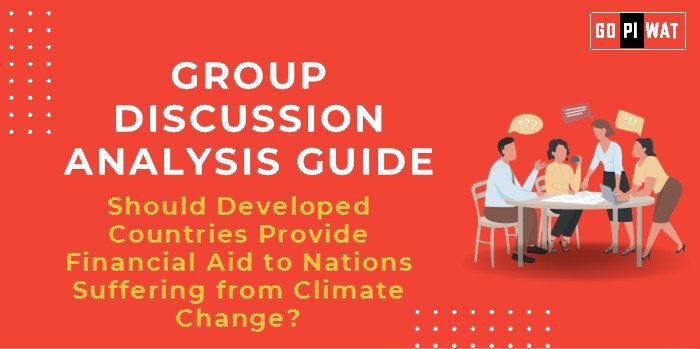📋 Group Discussion (GD) Analysis Guide
🌍 Topic: Should Developed Countries Provide Financial Aid to Nations Suffering from Climate Change?
📖 Introduction
- 💡 Context Setting: “Climate change, a global crisis with localized impacts, disproportionately affects vulnerable nations. For developed countries, aiding those most affected is not only a moral obligation but also a strategic necessity to mitigate global risks.”
- 📜 Background: The concept of climate aid gained prominence post-Kyoto Protocol (1997) and later through the Paris Agreement (2015), where developed nations committed to mobilizing $100 billion annually by 2020 to support climate-vulnerable nations. Despite extensions, achieving this goal remains contentious.
📊 Quick Facts and Key Statistics
- 🌍 Global Climate Finance Pledge: $100 billion/year target (Paris Agreement) remains unmet.
- 💸 Economic Losses: Climate-induced damages in developing nations exceed $150 billion annually.
- ⚡ Emissions Disparity: Top 20 emitters produce 78% of global CO2, while the most affected nations contribute less than 5%.
- 👥 Population Impacted: Over 1.2 billion people are highly vulnerable to climate change.
🌍 Stakeholders and Their Roles
- 🏛️ Developed Nations: Financial and technological providers.
- 🌍 Developing Nations: Recipients of mitigation and adaptation aid.
- 🤝 International Bodies: UNFCCC and the Green Climate Fund (GCF) oversee aid distribution.
- 💻 Private Sector: Increasing role in green investment and renewable technologies.
🏆 Achievements and Challenges
✨ Achievements
- 🌱 Green Climate Fund (GCF): Over $10 billion mobilized since 2015.
- 📈 Success Stories: Bangladesh’s Cyclone Preparedness Program supported by global aid.
⚠️ Challenges
- 💰 Funding Gap: The $100 billion/year pledge is largely unmet.
- 🔍 Misallocation: Aid often prioritizes mitigation over adaptation, disadvantaging vulnerable communities.
- 🌍 Global Comparisons: Germany and Norway lead in per capita climate finance, while some developed countries lag.
💡 Structured Arguments for Discussion
- ✔️ Supporting Stance: “Developed nations, historically responsible for the climate crisis, must assist developing nations to uphold global justice and stability.”
- ❌ Opposing Stance: “Financial aid alone fosters dependency; capacity-building initiatives are more sustainable.”
- ⚖️ Balanced Perspective: “While financial aid is essential, ensuring transparency and equal focus on adaptation and mitigation is crucial.”
📈 Effective Discussion Approaches
- 🗣️ Opening Techniques:
- 💬 Use a compelling statistic: “Climate-induced damages in low-income nations now surpass $150 billion annually.”
- 🌍 Begin with a global comparison or case study: “Norway’s high per capita aid exemplifies developed nations’ potential roles.”
- 🔄 Counter-Argument Handling: Example: “While aid dependency is a valid concern, integrating aid with skill development programs ensures long-term sustainability.”
🔍 Strategic Analysis (SWOT)
- 💪 Strengths: Ensures global stability and supports justice.
- ⚠️ Weaknesses: Risk of mismanagement and dependency.
- 🚀 Opportunities: Potential for green technology exchange and partnerships.
- ⚡ Threats: Political resistance and unequal distribution of funds.
🎓 Connecting with B-School Applications
📚 Real-World Applications
Discussions on sustainability or CSR strategies in B-school projects.
📋 Sample Interview Questions
- 💬 “Should financial aid for climate change be tied to specific outcomes?”
- 💬 “How can developed nations balance economic priorities with climate obligations?”
💡 Insights for B-School Students
- 🌍 Explore climate finance as a growing sector.
- 📖 Leverage case studies for internships in CSR or ESG roles.


